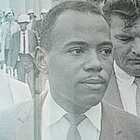


Susan Glisson
Mississippi bears the heavy weight of history when it comes to race relations. According to the William Winter Institute, this history gives Mississippi both the opportunity and responsibility to lead the nation’s continuing path toward equality.
For more than 10 years, the William Winter Institute for Racial Reconciliation has been a partner in Mississippi’s efforts to learn, grow and heal. That path toward progress includes confronting the past, fostering dialogue in the present and helping the next generation of Mississippians live with greater understanding and sensitivity about race relations and history.
With the goal of assisting Mississippi communities that seek racial reconciliation, the institute facilitates a process called the “Welcome Table” aimed at engaging community leaders in positive community-building.
“We’re not wedded to any outcomes in a community, because communities know best for themselves,” said Susan Glisson, Winter Institute executive director and assistant professor of Southern studies. “When parties in a community don’t necessarily trust each other, hopefully they can trust us, and we can help them create a safe space to build relationships, learn to respect each other and work together to identify and initiate a project they want to work on together. We support them throughout that entire process, up to and including working on whatever project they identify.”
Most of the communities that have sought the institute’s support have had well-known histories of racial violence. The institute supported the work of the Emmett Till Memorial Commission in Tallahatchie County, worked with Newton County to honor the family of Medgar Evers and helped the university organize commemorative activities surrounding the 40th anniversary of its desegregation. The institute also supported the Philadelphia Coalition, a group of Neshoba County leaders who banded together to commemorate the 1964 murders there of three civil rights workers in a process that ultimately led to the 2005 conviction of their killer, a feat of restorative justice.
The institute was also instrumental in forming Mississippi ARC, a coalition of progressive service groups working together to identify equitable policies. More than 60 organizations are part of an informal network that tackles topics ranging from health to juvenile justice to education.
Alongside its community-building efforts, the institute is committed to ensuring tomorrow’s leaders develop critical consciousness regarding race and civil rights history. The institute worked closely with the Mississippi Department of Education to implement a 2006 law requiring a civil rights curriculum in Mississippi’s public schools and to create curricular objectives. Thanks to support from the Kellogg Foundation, the institute also recently added an academic director to its staff, allowing it to form more academic partnerships across the UM campus.
Additionally, the institute established a Summer Youth Institute in 2010. The Summer Youth Institute invites rising high school sophomores and juniors to the Oxford campus. With the guidance of UM faculty members and undergraduate students, the youth spend nine days learning about civil rights history, being trained to analyze their communities in terms of strengths and weaknesses, and thinking about projects they can implement when they return home.
“We try to create a space where they can build relationships across various identity lines and become a team that’s going to support each other,” Glisson said. “Several have gone back and started really amazing projects concerning teen pregnancy, community gardens, mentoring programs and more. They’ve done tremendous work.”



